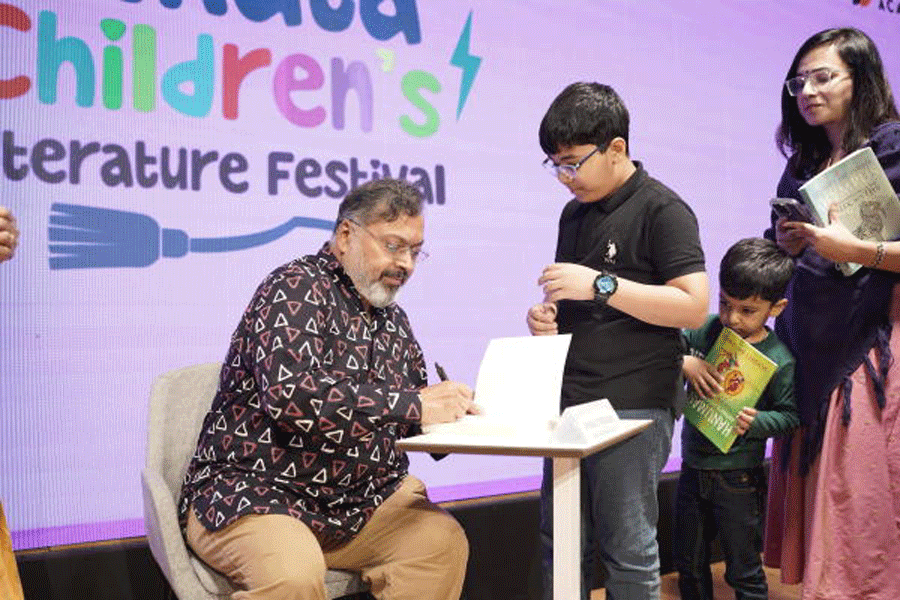The first edition of the Kolkata Children’s Literature Festival, held at SPK Jain Futuristic Academy, New Town, from January 12 to 14, was a tribute to the city’s storytelling tradition, flawlessly integrating the world of popular children’s literature with bookish themes and activities that ushered in entire crowds of little ones and grown-ups alike. A celebration of literature, reading, and the stories of the world, the event was marked by enthusiastic participation from authors, illustrators, educators, and storytellers, helping ignite and propel a passion for reading and imagination among young minds.
The second day of the festival saw two special marquee sessions. Renowned Indian mythologist and author Devdutt Pattanaik graced the audience for the first session titled ‘Traditional Wisdom and Cultural Values in the Modern Education System’. By offering attendees an insightful exploration of the way the ancient teachings of Indian mythology remain relevant in today’s world, Pattanaik enriched the festival with his discussion of the interplay between ancestral wisdom and contemporary lifestyles. This discussion also offered a unique perspective on the integration of ancient cultural values into modern education and highlighted their lasting relevance and impact.
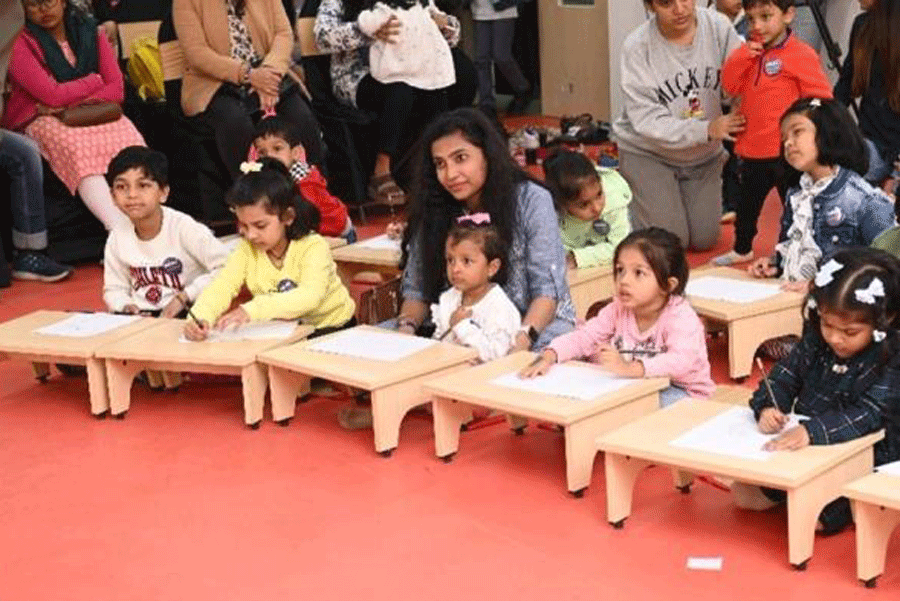
The festival included lots of activities to keep your little ones busy. Rashbehari Das and KCLF
“Mythology, or aakhyaanshastra, teaches us the meaning, the purpose of life. If we were to ask ourselves what our purpose was, we wouldn’t find the answer in science textbooks. We can only derive the true meaning of life from stories — from mythology. So, in a way, Indian mythology teaches us how to live. It teaches us to see the world from perspectives other than our own, which is vital in order to survive,” Pattanaik said, recounting popular stories from Hindu, Buddhist, and Jain mythologies.
The audience was kept engaged by tales of Kamdev, Yamraj, The Mahabharata, and Raja Parikshit, richly described by Pattanaik’s masterful storytelling which highlighted moral lessons, philosophical insights, and the cultural values embedded within these ancient narratives. The author’s eloquent narration and vivid descriptions brought these characters and their stories to life, creating an immersive experience that left a profound impact on the listeners.
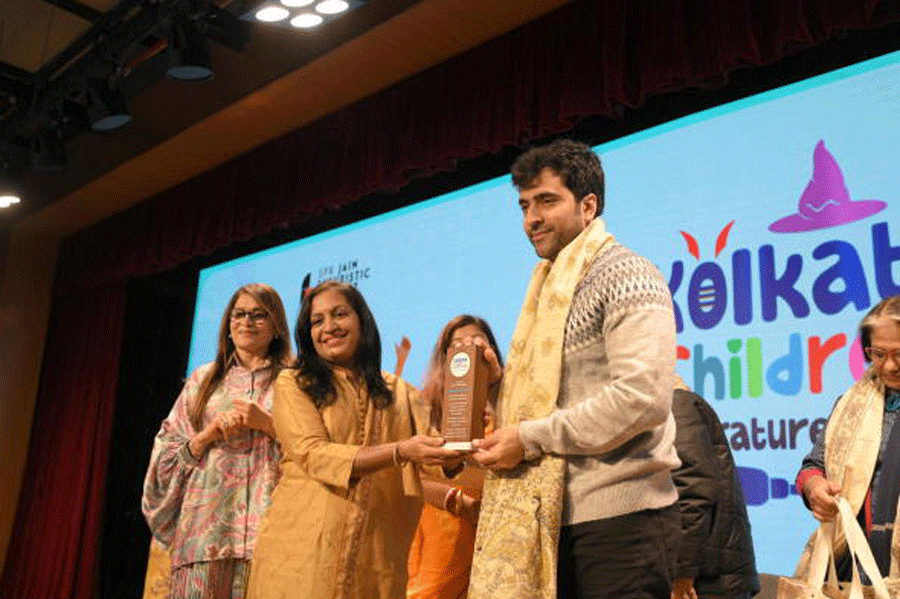
Actor Abir Chatterjee being felicitated by Kusum Patwa, member of Jain Sabha. Rashbehari Das and KCLF
The second marquee session of the day was ‘Children’s Literature in Bangla Cinema’ and a bunch of Tollywood stars were part of it. Filmmakers and actors Sudeshna Roy and Abhijit Guha, and actor Abir Chatterjee discussed bangla shishu shahityo, and the representations of characters from such literature on Bengali silver screens. Speaking of the profound impact that much-loved figures such as Goopy Gyne Bagha Byne, Feluda, and Byomkesh have left on young audiences via cinema, the panelists delved into questions of what essentially constitutes a children’s film, and how literature and films are two entirely different mediums of telling stories.
“Entertaining children is always the hardest, especially today because now we need to modernise literature for them. It’s not enough to just randomly pick a story from all the literature we have and then make a film. We need to present it in the right way, keeping the current context in mind. And not all films about children are necessarily children’s films. Jodi chhobi boroder ebong chhotoder similarly aakrishto kore, tobei kintu chhobitar sharthokota,” said Sudeshna Roy.
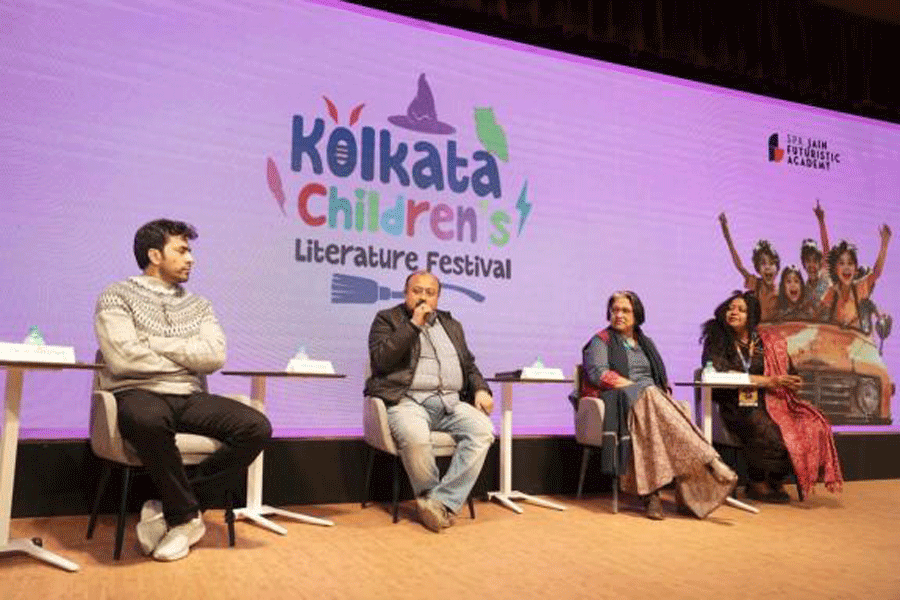
Abir and filmmakers Sudeshna Roy and Abhijit Guha spoke on children's literature in Bangla cinema. Rashbehari Das and KCLF
Abir Chatterjee delved into his experiences of playing some of the most popular Bengali fictional characters on screen. “I’m very honoured, privileged, and thankful for the fact that I have had the opportunity of playing such iconic characters, and I have had the good fortune of people enjoying my portrayal of them. Young people have come up to me and asked when my next Byomkesh movie is to release, because they said to them, Byomkesh was nostalgia. Feluda, again, is for an even younger audience, and Shonada, from the Guptodhon series, while not based on any existing literature, would be what Feluda would have been like if he were written today. These books, these movies, are part of our lineage, our heritage. Thankfully, because of such movies based on literature, young people are going back to the books and revisiting their childhood, which is a wonderful thing,” he said.
Abhijit Guha emphasised the difference between the written word and the silver screen. “It’s a misconception that people aren’t reading as much nowadays. I try to go to College Street at least once every month, and I’m told prottyek maashe oshonkhyo boi bikri hochhe. Boi kena kintu ekhono komeni. So, who is reading all these books? I’ve seen young people come up to stores and ask for books, by contemporary Bengali writers who write for their particular age group. Through the years, we have seen authors write for both adults and children. But in modern times, we filmmakers have not been able to make as many films for children as we have for adults. What’s important is pushing exactly the right buttons, so everyone emotes in a similar strain,” he said.
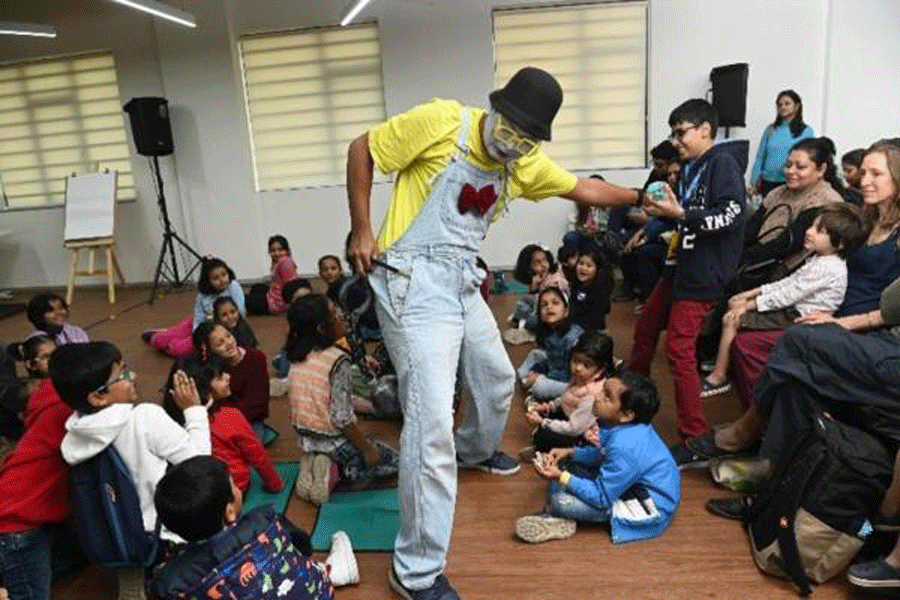
Miming was a big hit with the kids. Rashbehari Das and KCLF
All three guest panelists brought forward unique perspectives on the necessity of adapting stories for modern audiences. Highlighting the enduring appeal of iconic characters and the relevance of books in today’s digital age, their insights underscored a key message: whether through the written word or the silver screen, storytelling for children must, and has, evolved through the ages while preserving its essence, something that ensures that it resonates across generations.
The festival was also marked by various activities that catered especially to the little ones who dropped by. Accompanying the marquee sessions were workshops on illustration, puppetry, performance and visual storytelling, Vedic maths, creative writing, and clowning and miming, as well as author interactions.
“This is the first time the Kolkata Children’s Literature Festival has been organised in the city, and we’re looking forward to making this an annual event so that young children can have something to look forward to every year. In due course, we hope everyone will gather around Jain Futuristic Academy. It’ll be a conglomerate of youth success and stories, and we’ve had excellent support so far, so we’re keeping our fingers crossed,” said Sonal Choraria, member of the SS Jain Sabha.
